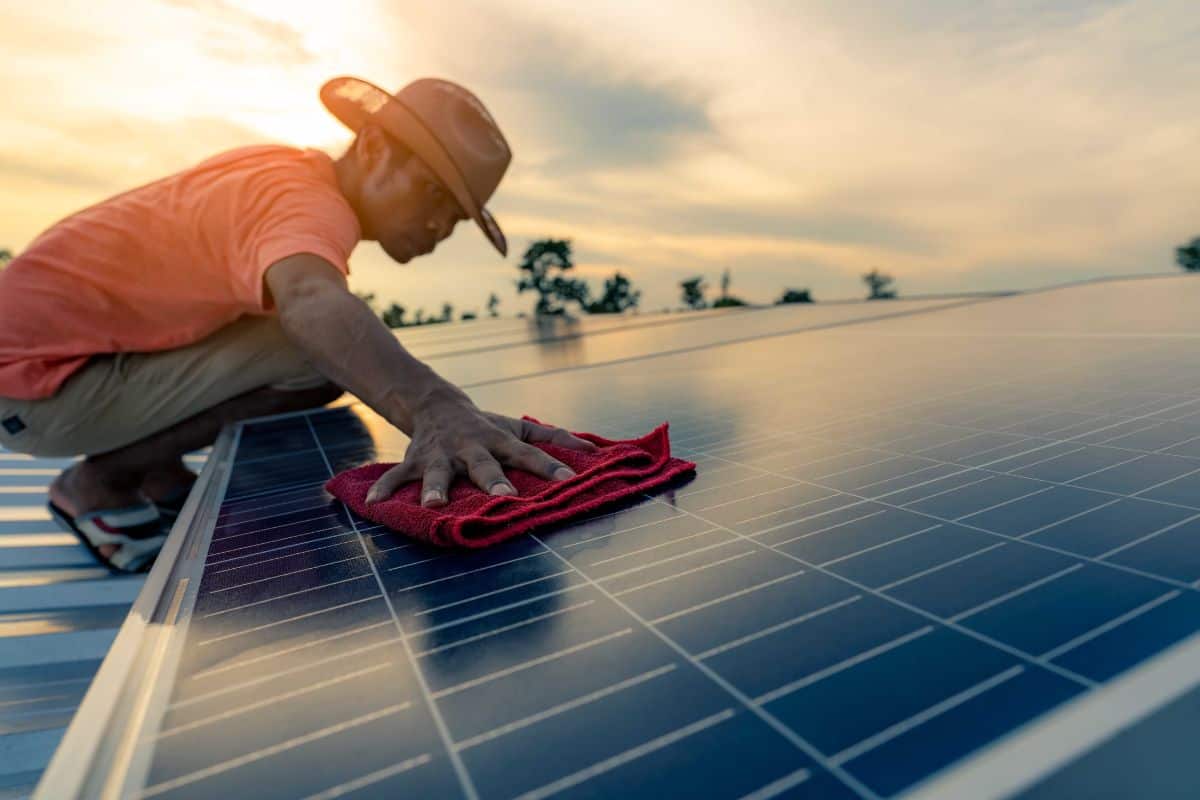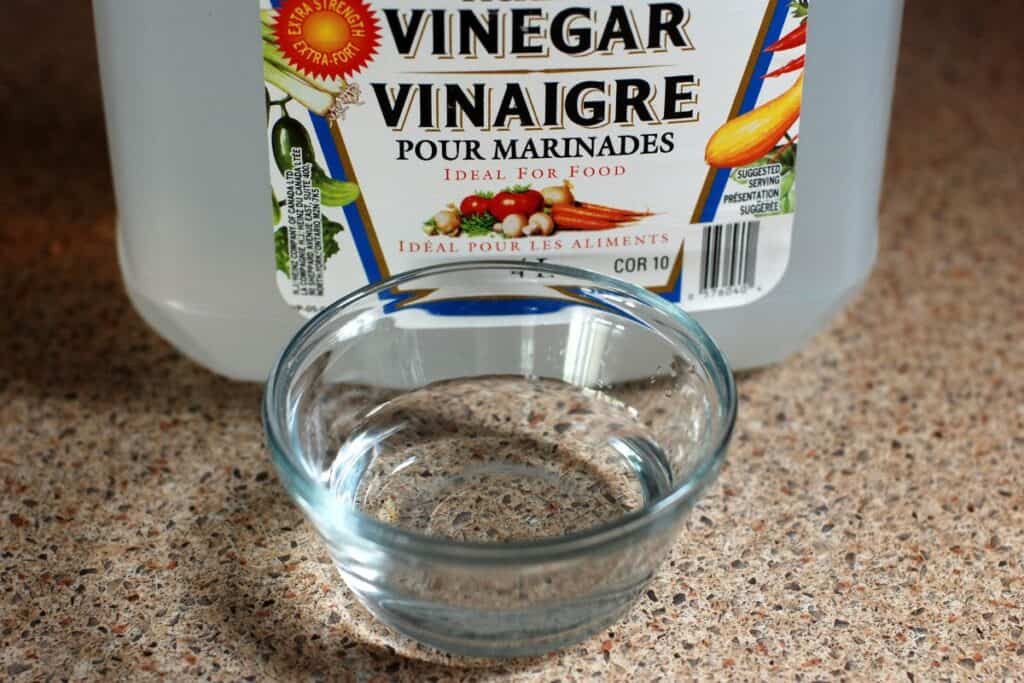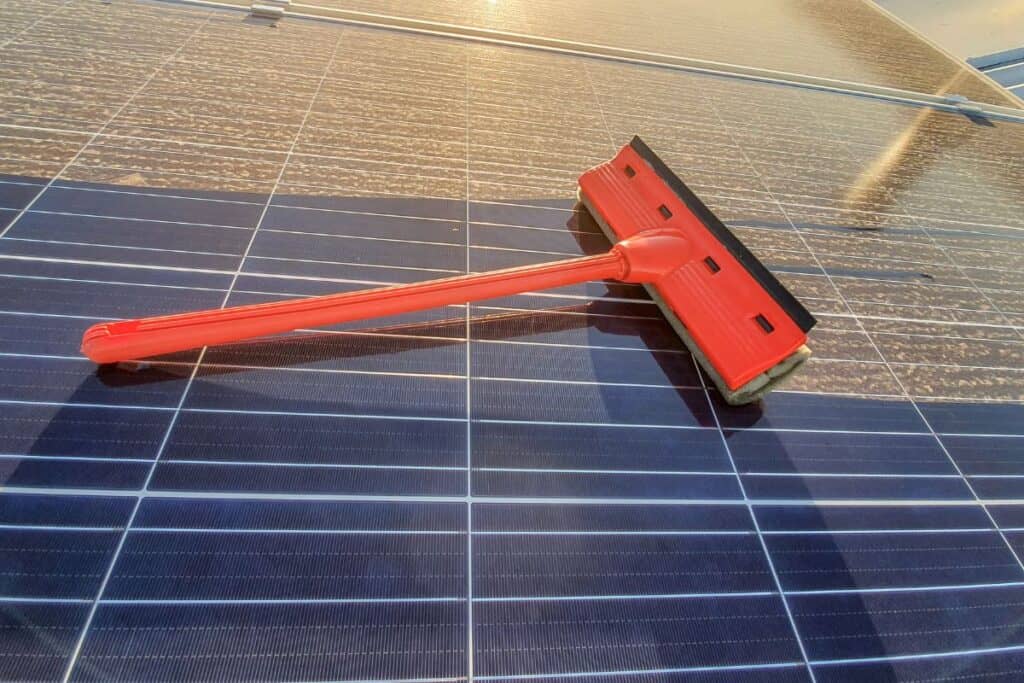“So, I’ve heard that vinegar can clean a lot of things, but can it actually clean solar panels?”
Well, you’ve heard right, but there’s a bit more to it.
Vinegar is indeed a popular household cleaner, but does it work well with solar panels? Let’s dive right in and answer this burning question…
Yes, you can use vinegar to clean your solar panels. Vinegar, particularly white vinegar, is a commonly used household cleaning agent that’s renowned for its versatility. It’s especially effective at dissolving mineral deposits, which can be a significant issue on solar panels in areas with hard water.
While vinegar can indeed help to clean your solar panels, it’s important to note that it shouldn’t be used undiluted. Mixing equal parts of vinegar and water can create an effective cleaning solution.

This solution can help you tackle the stubborn grime that accumulates on your panels over time without damaging them
Cleaning solar panels with vinegar is a process that requires care. You should first rinse the panels with water to remove any loose dirt or debris.
Then, use a soft brush or sponge to gently apply your vinegar-water mixture to the panels. You should avoid using any abrasive materials that could scratch the panels.
After applying the vinegar solution, rinse the panels again with water to ensure no residue is left behind.
There are a few considerations to keep in mind when using vinegar to clean your solar panels.
First, although vinegar is a milder cleaning solution compared to many commercial products, it can still potentially damage your panels if not used properly. It’s also crucial to consider the environmental impact.
Vinegar is biodegradable and non-toxic, making it a more eco-friendly choice. However, it’s still acidic and should be used sparingly to prevent potential harm to surrounding plants and wildlife.
Secondly, vinegar is most effective for treating hard water stains and mineral deposits. If your solar panels are mostly affected by dust, pollen, or bird droppings, vinegar may not be as effective as other cleaning methods.
Lastly, always remember that safety comes first. If your panels are roof-mounted and not easily accessible, it may be safer and more efficient to hire professional solar panel cleaners instead of attempting to do it yourself.
While vinegar can be used to clean solar panels, its effectiveness will depend on the specific type of dirt or residue on your panels.
Always take safety into consideration when cleaning solar panels, and remember that regular cleaning, whatever method you choose, will help to maintain your panels’ efficiency and longevity.

A Step-by-Step Guide: Cleaning Solar Panels with Vinegar
Well, now that we’ve established that vinegar is a potent ally for solar panel cleaning, I bet you’re asking, “So, how do I use it correctly?” Don’t worry, I’ve got you covered.
Here’s your step-by-step guide to using vinegar for cleaning your solar panels.
Vinegar, especially white vinegar, mixed with water forms an excellent eco-friendly cleaning solution for solar panels.
It’s gentle on the panel surface yet effective in removing grime and hard water stains. But remember, it’s important to use it correctly to avoid any potential damage.
Step 1: Create your cleaning solution by mixing equal parts of white vinegar and water. Pour this mixture into a spray bottle for easy application.
Step 2: Before you apply your vinegar solution, rinse the panels with clean water. This will remove any loose dirt or debris that could potentially scratch the panels during cleaning.
Step 3: Spray your vinegar solution generously across the panels. Focus more on areas with stubborn grime or mineral deposits.
Step 4: Use a soft brush or sponge to scrub the panels gently. Be careful not to apply too much pressure as it can damage the panels.
Step 5: Rinse the panels thoroughly with clean water. Make sure you wash off all the vinegar solution to avoid any residue or film on the panels.
It’s important to note that while vinegar is a fantastic natural cleaner, it’s not a cure-all solution.
Depending on the type of dirt or grime on your solar panels, you might need a stronger cleaning agent or professional cleaning services.
Additionally, if your panels are located on your roof, safety should be your primary concern.
If you can’t safely reach your solar panels, it’s best to hire professionals. They have the appropriate equipment and training to clean your panels without causing any damage or putting anyone at risk.
So there you have it – your comprehensive guide to cleaning solar panels with vinegar. Remember, regular cleaning and maintenance are key to ensuring your solar panels perform at their best.
A little effort goes a long way in maintaining the efficiency and longevity of your solar power system.
Is There a Better Alternative to Vinegar for Cleaning Solar Panels?
We’ve spent some time talking about the effectiveness of vinegar for cleaning solar panels, but it’s worth asking: “Is there something even better than vinegar?”
This is a fair question. Let’s delve into it and see what we can find…
Yes, vinegar is a safe, natural, and eco-friendly cleaning agent, but it may not be the most effective option for all situations. The effectiveness of vinegar can be limited when it comes to tackling stubborn grime, bird droppings, or heavy dust and soot accumulation.
In such scenarios, you may need something a bit more potent.
Commercial solar panel cleaning solutions are specifically designed to deal with the types of dirt and grime that commonly accumulate on solar panels.

These specially formulated cleaners can effectively break down and remove stubborn dirt and debris without damaging the panels. But remember, when using these solutions, ensure they are eco-friendly and non-abrasive.
Another more powerful natural cleaner is a solution of mild dish soap and water. This combination is excellent at cutting through stubborn grime and grease that may have collected on your panels.
Like vinegar, dish soap is gentle enough not to damage the solar panels but efficient at removing dirt.
For the more stubborn stains or built-up grime, consider using a cleaner with oxalic acid. Oxalic acid is a strong cleaning agent often found in rust removers and can help tackle tougher stains on your panels.
However, due to its potency, it should be used sparingly and rinsed thoroughly.
A cleaning method gaining popularity is using purified water systems. Purified water, devoid of minerals and other impurities, leaves no residues on the panel, reducing the need for a squeegee or drying.
Professionals often use this method, and while it may be costlier, it offers excellent results.
While these alternatives may provide better cleaning power, safety and accessibility must still be your top considerations.
And as always, if your panels are hard to reach or the cleaning task seems too daunting, hiring a professional solar panel cleaning service is your best bet. They will have the right tools, cleaning solutions, and safety equipment to do the job properly and safely.
Vinegar is a great starting point for DIY solar panel cleaning. But for tougher grime or large-scale cleaning tasks, there are certainly more potent alternatives available.
The key is finding a solution that provides the cleaning power you need while keeping your panels safe from damage.
